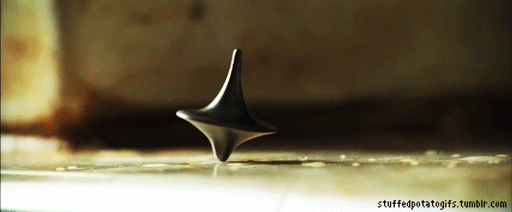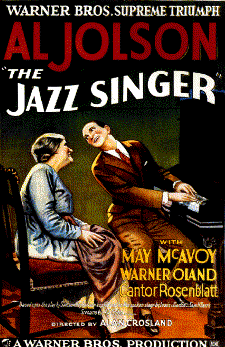Release Year: 1927
Director: Alan Crosland
Cast: Al Jonson, May McAvoy, Warner Oland, Eugenie Besserer.
Jonson's words (the first ones in film history) were recorded live on the set; that can be heard in the background noises of the scene.

Cast: Al Jonson, May McAvoy, Warner Oland, Eugenie Besserer.
Plot: After leaving his home as a kid because his jazz singer aspirations collided with his traditional and devout Jewish father (who raises him to be a cantor), Jakie Rabinowitz (now named Jack), tries to earn a living as an entertainer. What he doesn't know is that even years after his dispute with his father, his Jewish roots will call him again.
Review: "Wait a minute, wait a minute, you ain't heard nothin' yet! Wait a minute, I tell ya! You ain't heard nothin'! You wanna hear "Toot, Toot, Tootsie"? All right, hold on, hold on... [walks back to one of the band members] Lou, listen. Play "Toot, Toot, Tootsie", three chorus, you understand. In the third chorus, I whistle. Now give it to 'em hard and heavy, go right ahead". Those were the words that made history.
Jonson's words (the first ones in film history) were recorded live on the set; that can be heard in the background noises of the scene.
Produced by Vitaphone with the groundbreaking sound-on-disc technology, which recorded sound on a disc or phonograph and then synchronized it with the movie (quickly followed by sound-on-film, much more practical), 'The Jazz Singer' became extremely famous (and a huge commercial success) for being the first movie to include dialogues and songs (up to six performed by Al Jolson) synchronized with the film. Most of it is still silent, relying on intertitles and a score, but those two achievements (the songs and Jolson's character speaking to the audience and in a conversation with his mother), marked the end of the Silent Era and the beginning of the 'talkies', changing film history forever.
In terms of the movie itself, the addition of sound was not a mere curiosity. It's true that in this film you still have to read the intertitles for almost its entire run but the thought of not having to do it again and hearing Jonson talk and sing for the first time (what a voice...), is something even magical that you don't forget after having to watch hours and hours without a single word.

Al Jonson gives a wonderful performance, both acting and singing, together with McAvoy in a sweet love story
As of the story, I really didn't like the path taken by the facts. First, the hateful father beats Jackie even if he warns him that he will leave the house if he does it again and when he finally escapes, he cries. What a hypocrite! And then, when Jack has fought so much to achieve what he wants in live, he has no regrets and demands that he loses the chance of a lifetime to sing in his honor, saying that that's the only way he could be forgiven. Forgiven? Jack? The father should be ashamed of himself only for asking. And the mother, that's supposed to be the comprehensive one, even knowing how much Jack has struggled in live, is in favor of the father.
Much to my surprise, Jack agrees. I hate that ending. After an hour of beautiful songs and a blossoming love story, that was an awful way to end. I know people will say that it's his father and that he ends up succeeding anyway, but he didn't know that at the time of letting his dream go. Why must he give so much for someone who gives so much less for him?
.jpg)
.jpg)


No hay comentarios:
Publicar un comentario